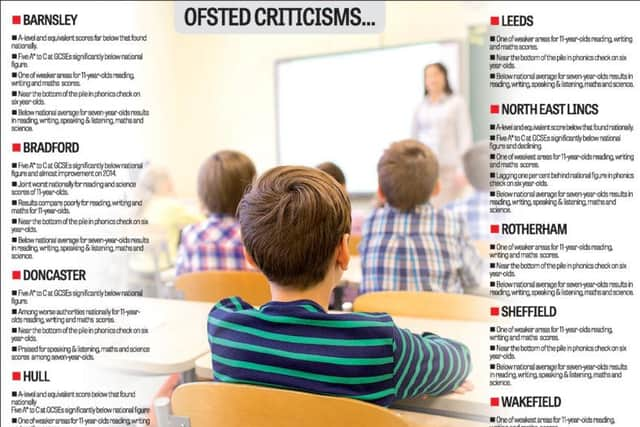Exclusive: Letters between Ofsted and council bosses shows concern over Yorkshire school standards


The Yorkshire Post revealed earlier this year that both Leeds and Sheffield Council had received such letters because of primary school results - despite not being among the worst performing areas in the region.
At the time the education watchdog said that it had sent letters to Yorkshire councils where school performance “deviated significantly from national averages in tests and exams to point out strengths and weaknesses”.
Advertisement
Hide AdAdvertisement
Hide AdHowever Ofsted declined to provide these letters or to say which councils had been told to improve results.


Now the Yorkshire Post has obtained the letters and the council replies to Ofsted under the Freedom of Information Act.
The documents reveal that nine of the 15 education authorities in the Yorkshire received a letter from Ofsted director Nick Hudson “to express concern and disappointment” at the figures while four councils received letters congratulating them on school results.
The authorities receiving the near identical negative letters from Mr Hudson were Barnsley, Bradford, Doncaster, Hull, Leeds, North East Lincolnshire, Rotherham, Sheffield and Wakefield.
Advertisement
Hide AdAdvertisement
Hide AdFour councils received letters congratulating them on their schools performance: Calderdale, North Lincolnshire, North East Lincolnshire and York.
The critical letters all follow the same format highlighting tests and exams results where an area’s performance lags behind the national average - ranging from A-level results down to phonics checks on six-year-olds.
All nine letters also all include the same warning which says that each’s areas performance compared to regional or national figures was “weak” and adding: “This is frankly inexcusable.”
Mr Hudson demands council chief executives tell him how they plan to hold officers and schools to account.
Advertisement
Hide AdAdvertisement
Hide AdThe Yorkshire Post has also obtained the replied which councils sent in response setting out school improvement plans.
Sheffield’s letter from Ofsted had highlighted concern that the city’s schools lagged behind the national average for 11-year-olds reading, writing and maths’ scores and in earlier tests at seven and the phonics check at six.
In response the council’s chief executive John Mothersole said the council had systematically tackled weaknesses in leadership and governance at some of the areas weakest schools. He added: “Your officials have seen previously the significant and continiuing impact of local authority monitoring and challenge on key stage two performance.”
He also highlighted the creation of Learn Sheffield - an arms length company run by all the city’s state schools responsible for school improvement.
Advertisement
Hide AdAdvertisement
Hide AdWakefield City Council’s chief executive Joanne Roney replied to Mr Hudson saying: “I assure you there is no complacency. Outcomes for all children are a key performance measure and a priority for the whole council.”
Doncaster Council’s chief executive Jo Miller sent Mr Hudson a copy of a council report detailing its “rapid improvement initiative” for pupils up to the age of 11. The report warns there were major gaps in primary school predictions and actual results for 11-year-olds in both maths and reading. It also says poor teaching is being addressed in schools of concern but warns a high degree of outstanding teaching was required to make up the deficit over time of “inadequate leadership of learning and teaching”.
The report said that raising attainment action plans were being developed by school leaders and that leading year six teachers were being recruited.
Barnsley Council’s chief executive Diana Terris’ reply to Mr Hudson says that she shares his concern that “education performance is not yet good enough and that Barnsley young people are disadvantaged by poor education outcomes.” However she voices surprise his letter did not acknowledge a meeting which had taken place a few weeks earlier between him and his team and council officials who were “frank and transparent sharing early results and reflecting our collective view that the pace of improvement needs to be accelerated.” She also outlined details of a system which categorises schools as being red, amber or green depending on performance .
Advertisement
Hide AdAdvertisement
Hide AdRob Walsh, the chief executive of North East Lincolnshire pointed out the area has the 2nd highest number of academies - run outside of the local authority - in the country. The council was criticised for both the performance of primary and secondary schools. However all of its secondary schools and 70 per cent of its primaries are academies - meaning the authority only had the power to intervene in schools serving 15 per cent of the areas’ children. Mr Walsh said he had forwarded Mr Hudson’s letter on to the Regional Schools Commissioner who is responsible for intervention in academies.
Bradford Council’s chief executive Kersten England’s reply said the council had reintroduced an Education Improvement Strategy Board and commissioned an independent report into education provision in the city.
Stella Manzie, one of the Government commissioners appointed to run Rotherham Council following a report into child sex exploitation in the town that found the authority was not fit for purpose, responded to Mr Hudson’s letter. She set out the council’s goal to ensure primary school pupils results match the national average.